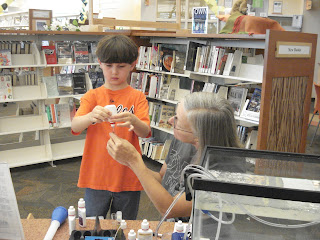I just participated in a number of back to school events with parents, teachers, principals and students. There seems to be a push for “Project Based Learning”, where the whole school is involved in a project and teachers from various disciplines create curriculum that relates to the project. (I am most familiar with our local Friends school that has been adopting PBL for a numberof years. One year, they monitored thewater quality of a local creek and had math, history and writing assignmentsthat related to this project.) Two of the schools that use our public library will beinvolved in projects having to do with the Chesapeake Bay. I mentioned that my library branch is raising horseshoe crabs. And we talked about all the cool, free resources that our state provides for the Horseshoe Crabs in the Classroom program, I was amazed to find that none of the teachers or principals were aware of it. This raises a huge question, “How do we let teachers know about wonderful resources that are available to them?”
 |
| Testing for ammonia in the Horseshoe crab tank |
But, as I thought about it, communication is an issue throughout many of the Citizen Science projects that I am aware of. As my branch has settled into our horseshoe crab project, we have realized that in order to keep the kids and the adults in the community engaged, we need to show them how raising the crabs, and our observations of them, are being used by real scientists. This feedback loop, unfortunately, takes some additional commitment from already stressed researchers.
Actually, I think that scientists themselves have difficulty planning the communication piece into their research. The concept of "Team Science" (collaborative research among far flung scientists) has proven to be very effective but it is fully dependent upon scientists communicating with each other. In addition, community acceptance of science and scientific credibility depends upon the scientists being able to communicate their findings with the public. So, this is a skill that future scientists really need to develop.
Citizen science has the ability to fully engage communities in the scientific process, but we are just at the beginning of tapping its potential. There are a lot of citizen science projects and resources out there. (And I hope to expand my list of them in the Resources section of this blog.) However, we need to have more effective ways of getting people involved and keeping them involved in longer term projects. Incorporating communication into the process is a big part of the answer.
No comments:
Post a Comment